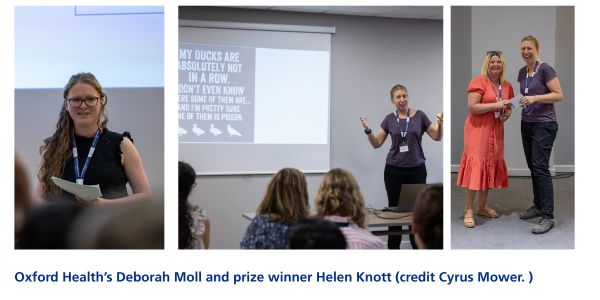The Celebrating NMAHPPs in Research Conference 2025, hosted by the Oxford Academic Health Partners (OAHP) and introduced by OAHP Chair Professor Sir Jonathan Montgomery, was the first event to bring together NMAHPPs from across Oxford’s two NHS trusts (Oxford Health and Oxford University Hospitals) and universities (University of Oxford and Oxford Brookes). The day served as a powerful reminder of the vital role NMAHPPs play not only in delivering health and care, but in shaping the future of NHS services through rigorous, practice-informed research.
Prominent themes included addressing health inequalities, advancing inclusive practice, and embedding evidence into everyday care – all key to the NHS’s goals of delivering equitable, person-centred health and care services. Of the more than 80 oral presentations and posters shared throughout the day, many explored research into the experiences of minoritised communities, the integration of digital innovations into care pathways, and improving outcomes in areas such as frailty, cancer, mental health, and long-term conditions.
There was also a strong focus on supporting clinical academic careers and creating the conditions for NMAHPP-led research to thrive, reflecting NHS England’s call to grow a research-active workforce.
As well as bringing together local NMAHPP professionals, the conference featured keynote presentations from several of England’s NMAHPP research leaders.
Professor Alison Richardson, Head of Nursing Research (Academic Leadership & Strategy) at NHS England, spoke on how health and care professions are working to achieve excellence in research. She highlighted examples from the day’s programme of Oxford-based studies that support NHS strategic shifts towards preventing illness, moving care closer to home and harnessing technology and data.
“Everybody in this room has a role in inspiring other people,” she said, “whether as an individual, a team, or organisation. Whatever stage you’re at in your research careers, you can make that whole shift together.”
Professor Dawn Carnes, Director of the Community for Allied Health Professions Research (CAHPR), overviewed strategic health priorities across England and Wales, the critical role of the allied health professions in all aspects of research, and the support available to individuals to build the necessary research capacity.
“We weren’t all made to be researchers – we became researchers, we learned how to do research, and so it’s a journey,” she said. “We need research skills, we need to learn, to build capacity and of course we need funding.”
Professor Carnes emphasised the importance of making research part of everybody’s business at the grassroots level and how curiosity is a key element in driving research and improving working environments.
In the day’s final keynote, Professor Michelle Briggs, Director of Nursing at Liverpool University Hospitals, offered a call to action to embed research as a core part of every health professional’s role, not a luxury or afterthought. She reflected on her own unconventional path into research and the power of networking (however uncomfortable it might be) to support her clinical academic career. She also introduced the IDEA framework, a model used at Liverpool Hospitals to empower staff across professions to take ownership of their research potential, and the part they play, however big or small it may be.
“Everybody has something they can do to be research active,” she said, emphasising that research isn’t about climbing a hierarchy, but recognising that everyone belongs in the space. “The challenge is, what’s your role in research in the job you do now?”
At the end of the day, prizes were presented for the top-rated oral presentations and posters. Many congratulations to:
- Julie-Ann Moreland, Academic and Clinical Diagnostic Radiographer, Oxford University Hospitals NHS FT – What factors influence approach and participation in research?
- Lottie Carney-Smith, Trainee Advanced Nurse Practitioner, Oxford University Hospitals NHS FT – Optimising Toxicity Monitoring and Dosage Adjustments in Patients on Adjuvant Abemaciclib for Breast Cancer (poster)
- Ninette O’Mara, Specialist Speech and Language Therapist, Oxford University Hospitals NHS FT – Patient-centred decision making in the use of thickened fluids: A comparative case study (poster)
- Elizabeth Urwin, Trainee Clinical Scientist (Nuclear Medicine), Oxford University Hospitals NHS FT – Investigation of the Dosimetry Differences Between Pre-Therapy SPECT/CT and Post-Therapy PET/CT Scan in Selective Internal Radiation Therapy
- Helen Knott, Clinical Specialist Physiotherapist, Oxford Health NHS FT – An evaluation of community-based treadmill training in Parkinson’s Disease to improve gait speed
- Jenny Dod, Lecturer/Paramedic, Oxford Brookes University – Exploring student paramedics’ experiences of sexual harassment from colleagues whilst on practice placement in UK ambulance services
- Lizzie Stafford, Research Nurse Manager, University of Oxford – A taste for our own medicine? Drivers of uptake for seasonal vaccination among healthcare workers

Published: 17 July 2025

